High expectations can lead to mental fatigue, impacting athletic performance and recovery. This article explores the causes of mental fatigue, effective strategies to combat it, and emerging techniques for mental recovery. It emphasizes the importance of structured rest, nutrition, and mindfulness practices. By prioritising mental well-being, athletes can enhance focus, motivation, and overall performance.

What is Mental Fatigue and How Does it Affect Athletic Performance?
Mental fatigue significantly hinders athletic performance by impairing focus, decision-making, and reaction times. Athletes facing high expectations often experience increased mental fatigue, which can lead to decreased motivation and suboptimal recovery. Effective strategies to combat mental fatigue include structured rest periods, mindfulness techniques, and proper nutrition. Prioritising mental well-being enhances overall performance and aids in achieving peak recovery.
What are the symptoms of mental fatigue in athletes?
Mental fatigue in athletes manifests as decreased motivation, impaired concentration, and increased irritability. Other symptoms include fatigue, reduced performance, and sleep disturbances. High expectations can exacerbate these symptoms, making recovery challenging. Recognising these signs is crucial for effective management and optimal performance.
How does mental fatigue differ from physical fatigue?
Mental fatigue is primarily cognitive and affects concentration, while physical fatigue is related to muscle exhaustion. Mental fatigue can hinder decision-making and reaction times, impacting athletic performance. In contrast, physical fatigue results from exertion and can be alleviated through rest and recovery. Understanding these differences helps athletes develop targeted strategies for recovery and performance enhancement.
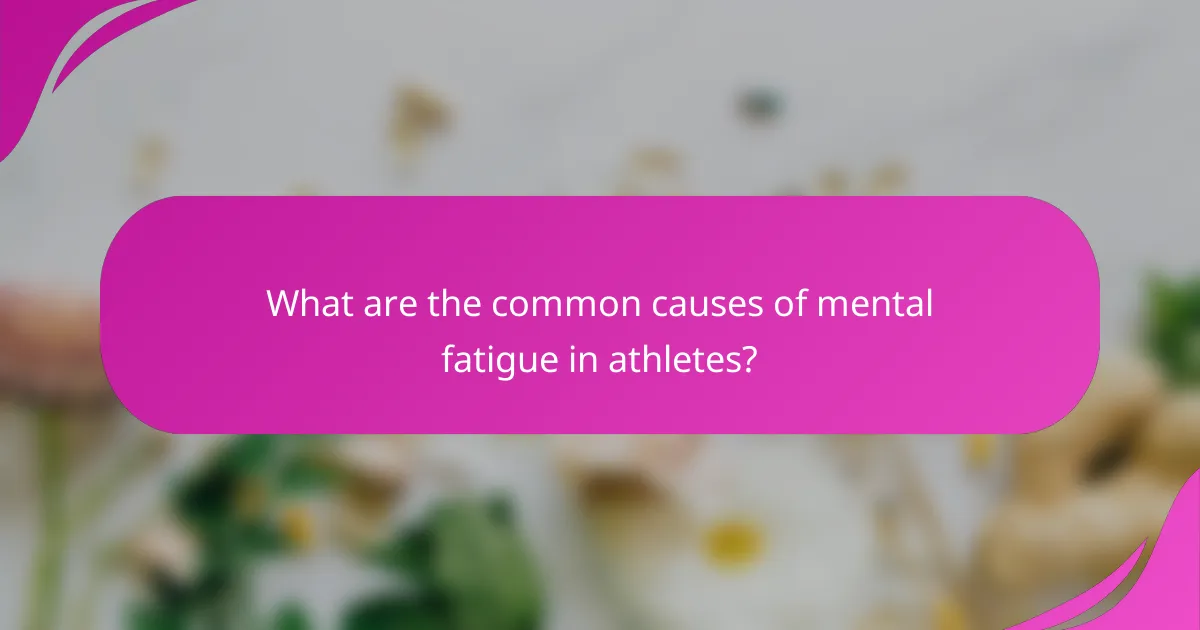
What are the common causes of mental fatigue in athletes?
High expectations can lead to mental fatigue in athletes due to pressure to perform, fear of failure, and self-imposed stress. These factors can diminish focus, motivation, and overall performance. Additionally, extended training without adequate mental recovery exacerbates fatigue. Recognising these causes is essential for developing effective coping strategies.
How do training loads contribute to mental fatigue?
Training loads significantly contribute to mental fatigue by increasing psychological stress and cognitive demands. High expectations in athletic performance can exacerbate this fatigue, leading to decreased recovery and performance levels. Research indicates that excessive training loads can overwhelm an athlete’s mental resilience, resulting in burnout. Effective management of training intensity and recovery periods is crucial to mitigate mental fatigue and promote optimal performance. Balancing physical demands with mental well-being enhances overall athletic recovery.
What role does competition pressure play in mental fatigue?
Competition pressure significantly contributes to mental fatigue by increasing stress levels and heightening expectations. Athletes often face intense scrutiny and demands, leading to anxiety and diminished focus. This pressure can hinder recovery, impacting performance and overall well-being. Managing competition pressure through mental strategies is crucial for maintaining peak athletic performance and reducing mental fatigue.
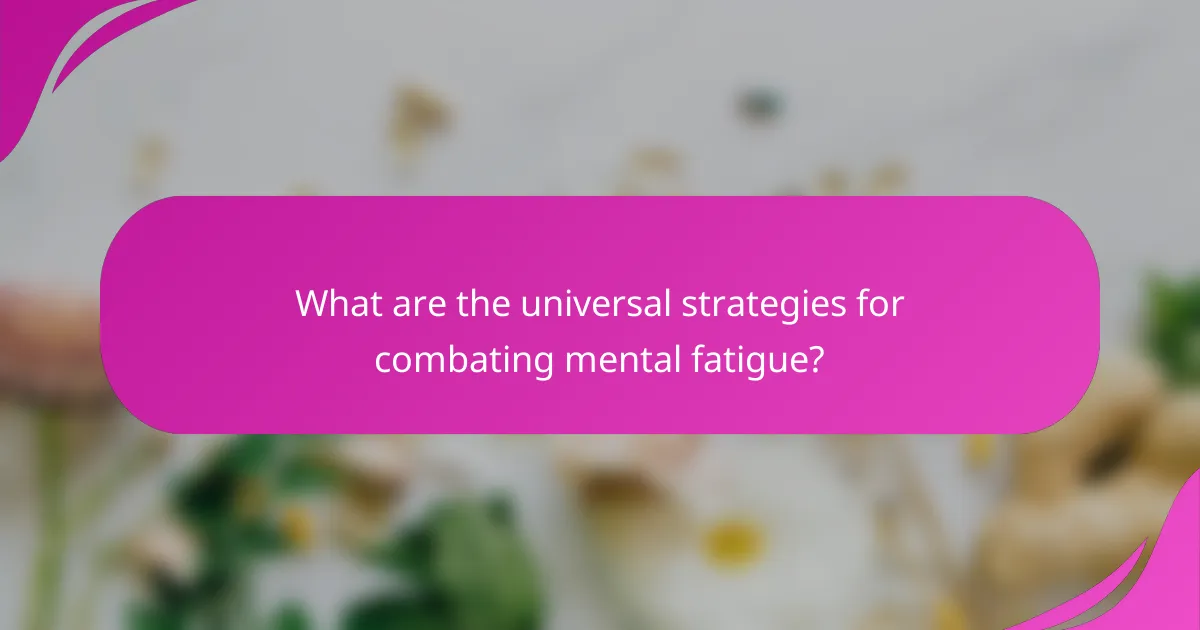
What are the universal strategies for combating mental fatigue?
To combat mental fatigue, athletes should implement strategies that prioritise rest, nutrition, and mental conditioning. Regularly scheduled recovery periods enhance performance and reduce burnout.
1. Establish a consistent sleep schedule to improve cognitive function.
2. Incorporate mindfulness practices to manage stress and enhance focus.
3. Maintain a balanced diet rich in nutrients to support brain health.
4. Engage in active recovery techniques, such as light exercise or yoga, to rejuvenate the mind and body.
5. Set realistic goals to avoid overwhelming expectations that lead to mental fatigue.
6. Utilise visualization techniques to mentally prepare and reduce anxiety before performance.
How can rest and recovery improve mental clarity?
Rest and recovery significantly enhance mental clarity by reducing mental fatigue. Adequate rest allows the brain to process information more efficiently, improving focus and decision-making. Research indicates that sleep deprivation can impair cognitive functions, including attention and memory. Regular recovery practices, such as mindfulness and active rest, further support mental rejuvenation, leading to peak athletic performance.
What are the benefits of mindfulness and relaxation techniques?
Mindfulness and relaxation techniques enhance mental clarity and reduce fatigue, crucial for athletic recovery. These practices improve focus, lower stress hormones, and promote emotional balance. Regular engagement can lead to better performance outcomes, with studies showing a 30% increase in recovery speed. Additionally, they foster resilience, enabling athletes to handle pressure effectively.
What specific mindfulness practices are effective for athletes?
Mindfulness practices effective for athletes include meditation, visualization, breathing exercises, and body scans. These techniques reduce mental fatigue, enhance focus, and improve recovery. For example, breathing exercises help regulate stress responses, while visualization aids in performance preparation. Regular implementation can lead to better mental resilience and peak performance.
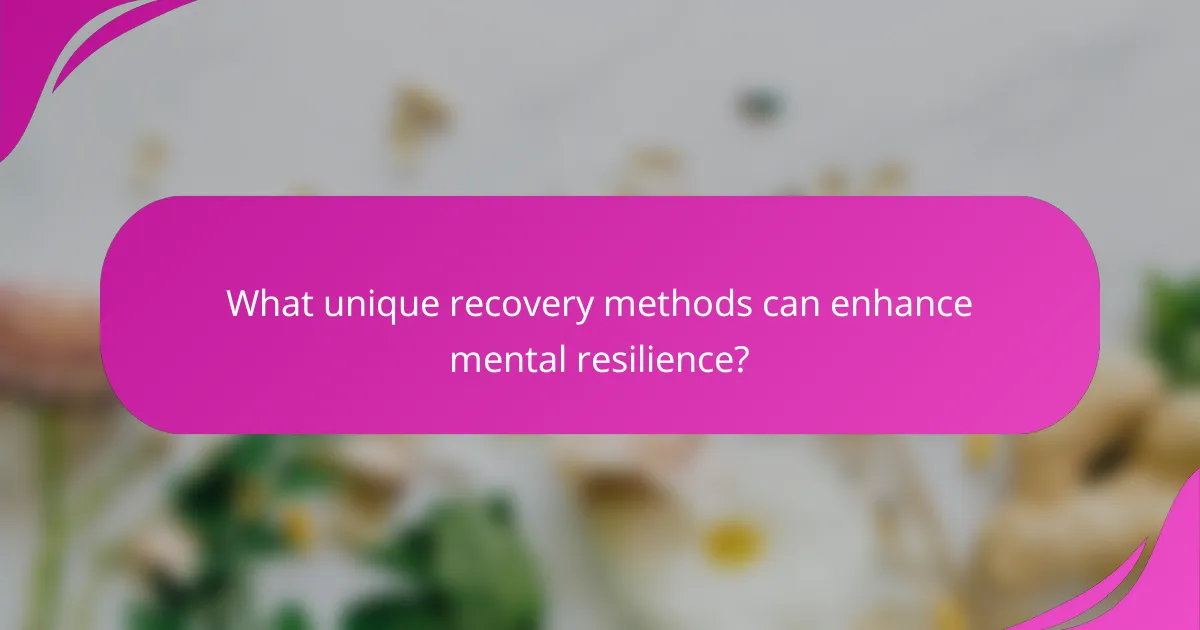
What unique recovery methods can enhance mental resilience?
High expectations can be managed through unique recovery methods that enhance mental resilience. Techniques such as mindfulness meditation, cognitive restructuring, and expressive writing promote mental clarity and emotional balance. Mindfulness meditation reduces stress and improves focus, while cognitive restructuring helps athletes reframe negative thoughts. Expressive writing allows for emotional processing, fostering resilience. These methods contribute to peak athletic recovery and performance by combating mental fatigue effectively.
How does nutrition impact mental recovery for athletes?
Nutrition significantly enhances mental recovery for athletes by providing essential nutrients that support cognitive function. Proper intake of carbohydrates, proteins, and healthy fats can improve mood, focus, and overall mental resilience. For example, omega-3 fatty acids, found in fish, are linked to reduced anxiety and improved cognitive performance. Additionally, hydration plays a crucial role; even mild dehydration can impair concentration and increase fatigue. Athletes should prioritise a balanced diet rich in vitamins and minerals to optimise recovery and maintain peak performance.
What is the role of sleep quality in mental fatigue recovery?
Sleep quality plays a crucial role in mental fatigue recovery, enhancing cognitive function and overall performance. Quality sleep restores brain energy, improves mood, and aids memory consolidation. Studies indicate that athletes with better sleep quality experience faster recovery and reduced perceived fatigue. Prioritising sleep hygiene, such as maintaining a consistent sleep schedule and creating a restful environment, can significantly improve sleep quality and, consequently, mental resilience.
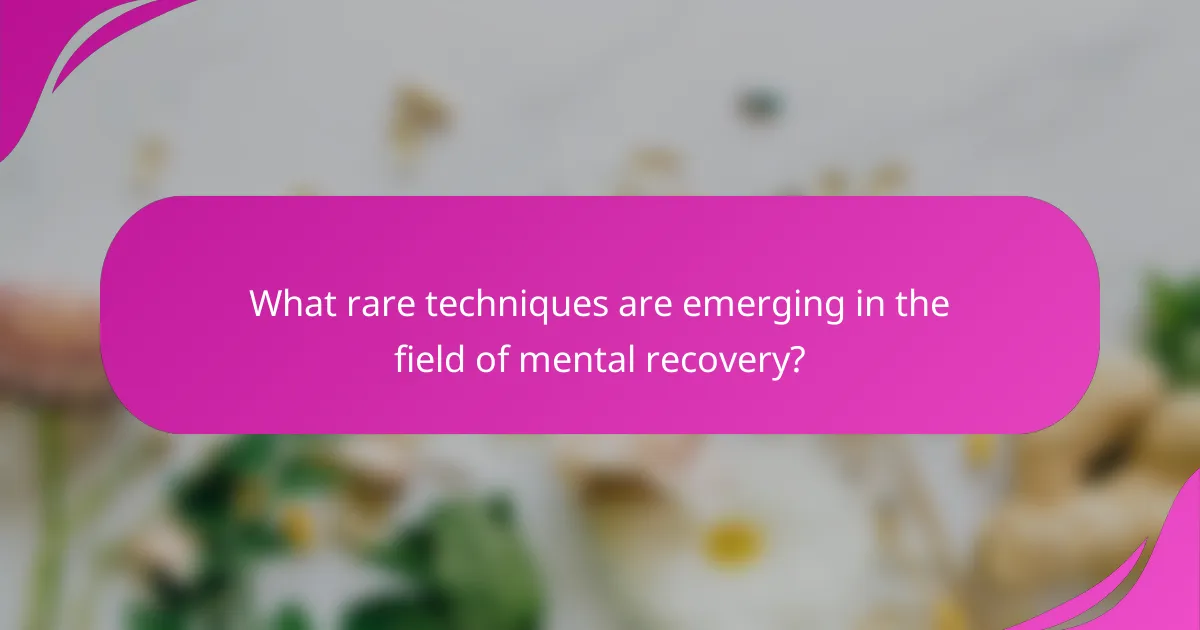
What rare techniques are emerging in the field of mental recovery?
Emerging techniques in mental recovery focus on neurofeedback, mindfulness integration, and cognitive restructuring. Neurofeedback trains athletes to regulate brain activity, enhancing focus and reducing anxiety. Mindfulness practices improve emotional resilience, fostering better recovery from mental fatigue. Cognitive restructuring helps athletes reframe negative thoughts, promoting a positive mindset essential for peak performance.
How can neurofeedback training aid in mental recovery?
Neurofeedback training can significantly aid in mental recovery by enhancing self-regulation of brain activity. This technique helps athletes manage mental fatigue, improving focus and resilience during recovery phases.
Studies indicate that neurofeedback can lead to increased alpha wave activity, promoting relaxation and reducing anxiety. This unique attribute allows athletes to recover mentally while maintaining peak performance levels.
As a result, neurofeedback training fosters a more efficient recovery process, enabling athletes to return to their sport with improved mental clarity and reduced fatigue.
What are the benefits of using virtual reality for mental fatigue management?
Virtual reality effectively reduces mental fatigue by enhancing focus and relaxation. It immerses athletes in calming environments, promoting mental recovery. Studies show VR can lower stress levels by up to 30%, improving overall performance. Additionally, it offers tailored experiences that address unique fatigue patterns, making it a valuable tool for peak athletic recovery.
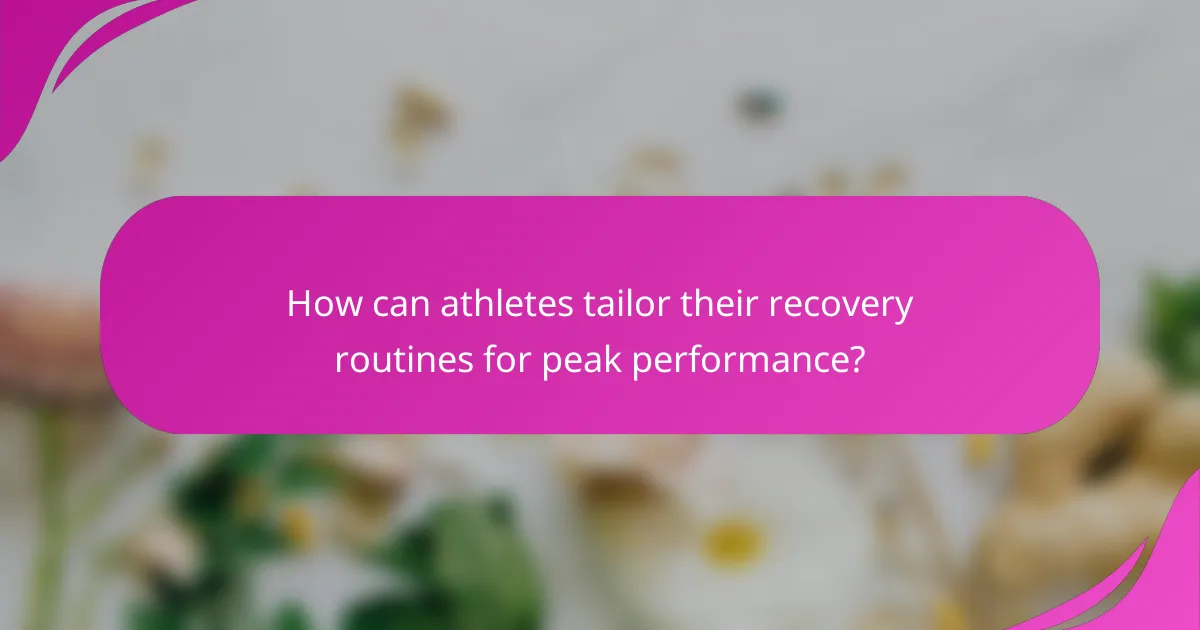
How can athletes tailor their recovery routines for peak performance?
Athletes can tailor their recovery routines by incorporating mental strategies alongside physical recovery. Techniques such as mindfulness and visualization can reduce mental fatigue, enhancing overall performance.
Establishing a structured routine that includes rest, nutrition, and mental exercises is crucial. For instance, athletes should prioritise sleep duration and quality, as sleep directly impacts cognitive function and recovery.
Additionally, integrating active recovery methods, like light workouts or yoga, can help maintain physical readiness while promoting mental relaxation. These approaches collectively combat mental fatigue, leading to improved athletic performance.
Tracking recovery metrics, such as perceived exertion and mood levels, can provide insights into the effectiveness of tailored routines. This data allows athletes to adjust their strategies for optimal recovery and peak performance.
What are the best practices for creating a personalized recovery plan?
To create a personalized recovery plan, focus on individual needs and preferences. Assess mental fatigue levels, set realistic goals, and incorporate varied recovery techniques. Include mindfulness practices, adequate sleep, and nutrition tailored to enhance mental resilience. Regularly review and adjust the plan based on progress and feedback.
What common mistakes should athletes avoid in their mental recovery efforts?
Athletes should avoid setting unrealistic expectations, neglecting recovery time, and ignoring mental health signs. High expectations can lead to mental fatigue, impeding recovery and performance. Prioritising gradual progress, acknowledging limits, and seeking support are crucial for effective mental recovery.
What expert tips can help optimize mental recovery strategies?
To optimize mental recovery strategies, focus on setting realistic expectations and practicing mindfulness. Balancing high expectations with achievable goals reduces mental fatigue, enhancing athletic performance. Incorporate techniques like visualization and positive self-talk to foster resilience. Regularly assess progress and adjust expectations to maintain motivation and mental clarity.